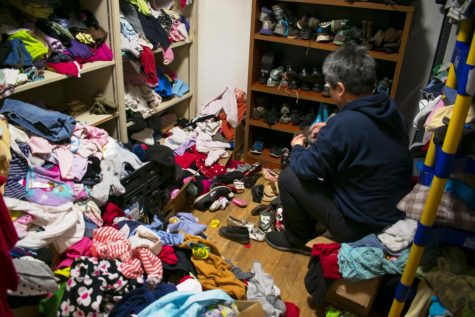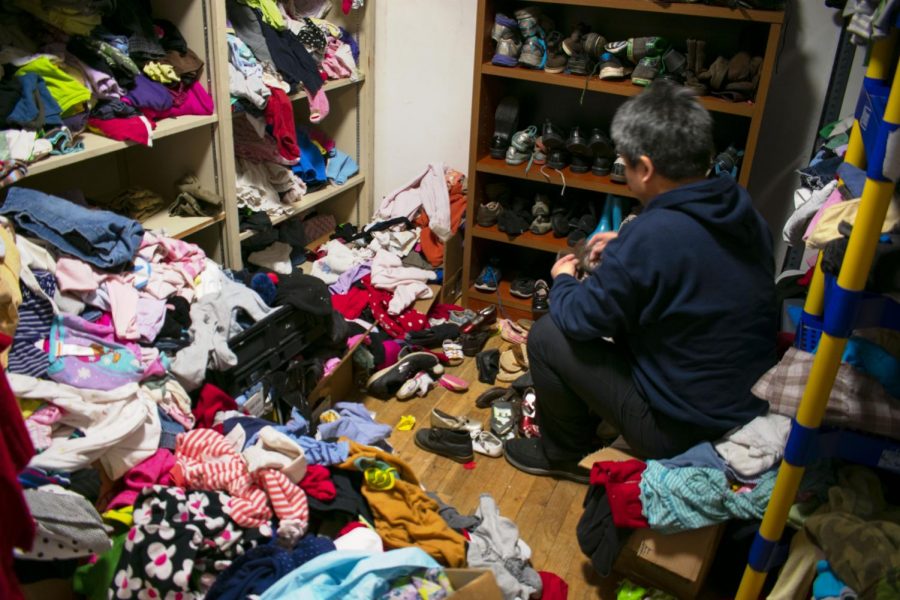Updated: APOYO’s lease with CWU will not be renewed
January 15, 2020
After CWU decided not to renew its lease with Allied People Offering Year-Round Outreach (APOYO) food and clothing bank, students and community members rallied in support of the organization. APOYO is now in search of a new space within the community. ASCWU Vice President for Equity and Community Affairs Jessica Hernandez provided an update about APOYO’s relocation at a public meeting held on Feb. 10.
Hernandez met with Dean of Student Success Gregg Heinselman on Feb. 7 to discuss ASCWU’s resolution regarding CWU’s lease with APOYO. Hernandez said APOYO can no longer be located on campus, but they can choose a space within the community as close to campus as they want. APOYO’s proximity to CWU is part of what makes them a valuable resource to students and the community, according to several APOYO staff and volunteers.
According to Hernandez, APOYO will be partnering with Friends in Serving Humanity (FISH) food bank to seek the resources necessary to either find a new location or to renovate an older building. APOYO is currently looking at three potential spaces to relocate to when their current lease ends in June, Hernandez said. FISH has also offered APOYO a space within their building. According to Hernandez, this would specifically be a row or shelf for the food APOYO provides, which is catered more to the LatinX population.
Hernandez said she would be in direct communication with APOYO faculty and staff about what they want to see out of the resolution passed by ASCWU.
______________________________________________________________________________________________________________________
CWU has decided not to renew the lease with APOYO based on lack of student engagement and the physical condition of the building. The organization will have to find a new space by June 30, 2020 in order to continue operating.

APOYO, which is also Spanish for “support,” is a non-profit food and clothing bank that has served the lower income community in Ellensburg and surrounding areas since 1999. According to the organization’s website, APOYO provides “ethnically sensitive food and support to a diverse population in our area.” APOYO also serves as a social center for the Mexicano community, according to Founder and President Philip Garrison.
While not affiliated with the university, APOYO has been located on CWU’s campus since 2001.
Over its time on campus, APOYO has been moved three times. Most recently in 2015, the organization was moved to a building near the Brooklane apartments.
“When we came into this [building] we complained that it was too small,” Philip said.
He added that originally, APOYO was only going to be given half of the space in the building. To make up for lack of space, two shipping containers are kept on the property for donated items that can’t fit inside of the building, such as furniture, appliances and toys. Patricia said that even with the shipping containers, there is not enough space on the property for the amount of items donated to APOYO.
“Moving us into our current location was an insult to our clients,” Patricia said. “This level of disrespect is an even greater insult to the Hispanic students and the community that Central hopes to serve.”
Lease Agreement with CWU
APOYO keeps its space with CWU based on the conditions outlined in a lease agreement with the university. The lease agreement is renewed on a year-to-year basis.
Patricia Garrison, secretary and treasurer of APOYO, said the organization was not directly informed by CWU that the agreement would not be renewed for next year’s occupancy. She said they were told indirectly by the Friends in Serving Humanity (FISH) food bank.
Dean of Student Success Gregg Heinselman said Philip reached out to facilities in regards to the leased space in fall. CWU Facilities directed Philip to the student success department and Heinselman met with Philip on Nov. 26. During their meeting, Heinselman informed Philip that the lease might not be extended. Heinselman said Philip has been formally notified through email about the termination of the lease, but he has not yet responded.
The lease states either party can choose to terminate the agreement with 30 days written notice. APOYO’s lease will end on June 30, 2020, at which point it will not be renewed, Heinselman said. This gives APOYO about six months to find a new space.
“We wanted to be fair and give them as much notice as possible,” Heinselman said.
REASONS FOR TERMINATION
Student engagement is a condition within the lease agreement. According to the lease, CWU and APOYO are to arrange opportunities for students to participate as volunteers, interns or otherwise. Heinselman said students have not been engaging with the space.
“We’ve offered it to the student community for service opportunities, but to date, there’s almost been little-to-no participation,” Heinselman said.
Another condition is that CWU can end the lease based on the physical condition of the facility. Buildings on campus are assessed each year and are rated on a scale from 1 to 5, with 5 being the worst condition. The building currently housing APOYO has a condition rating of 4.49, which is the worst condition of any facility on campus.
“APOYO’s been in a building for a couple years that…we shouldn’t be using as a structure for any purpose other than probably storage,” Heinselman said.
Whether or not the building will be demolished is up to CWU Facilities, Heinselman said, and given the current condition of the space, it’s not likely to be around much longer.
FISH and APOYO
The Washington state legislative capital budget for 2019-21 included almost $81 million toward the 13th Legislative district, with $772,000 going towards the FISH community food bank for a new space. Heinselman said FISH has reached out to APOYO to collaborate with them in a new space, which is another reason that CWU has decided to terminate the lease.
“It’s a nice opportunity for them to partner with the community and grow what’s available in a facility that’s designed and is appropriate and collaborates with other community resources,” Heinselman said. “As a state institution, it’s the right approach for us to take…knowing that there’s an opportunity for them at the end.”
According to Patricia, APOYO provides services that other food banks such as FISH doesn’t provide. Nearly every person who works and volunteers for APOYO is bilingual.
According to Patricia, unlike FISH, APOYO doesn’t keep any information about any of their clients. Another main difference is that nobody is turned away from APOYO. Every Wednesday and Saturday, anyone can come to APOYO and walk away with a box of food. A basic package includes a whole frozen chicken, rice, beans, masa, oatmeal, bread and whatever canned goods and produce are available.
APOYO does not limit its services to Kittitas county, according to Patricia. Last month, the organization fed 369 families from all over the region, some as far away as Mattawa.
In addition to food, APOYO also provides clothing, toys, furniture and appliances. The organization will also deliver food to people who are unable to make it to APOYO, or in case of emergencies.
According to APOYO’s website, 106,000 pounds of food were distributed to 3,500 households consisting of 12,600 individuals, an increase of 36% percent from the previous year. Phillip and Patricia said one reason for the increase in clients is the recent cut to Supplemental Nutrition Assistance Program (SNAP) benefits.
The differences in how the two organizations are run would cause problems if APOYO were to share a space with FISH, according to both Philip and Patricia.
“If we lose this place we have nowhere else to go, that’s the end of it,” Philip said




Alexander • Jan 17, 2020 at 9:50 pm
I am not bilingual, but I would like to know if there is anything that I can do to help. I can do menial labor, and I have experience in building web pages, graphic design, and marketing work.
Mitchell LaRiviere • Jan 16, 2020 at 6:50 pm
Have faith and God will work everything out, don’t worry